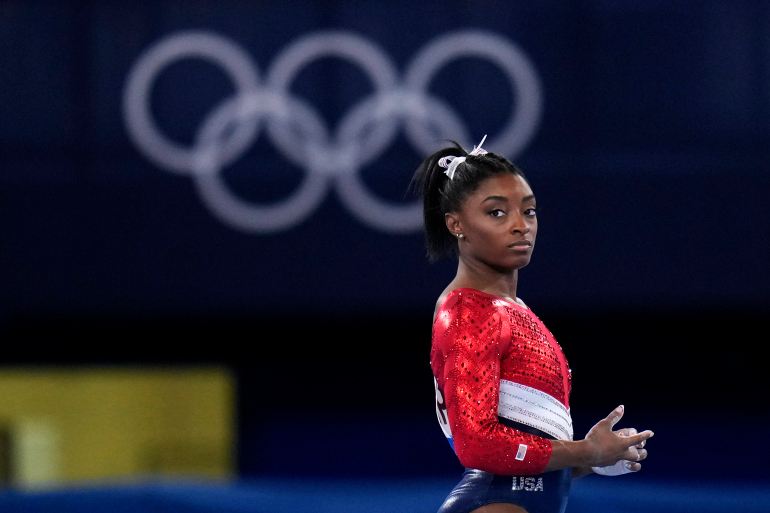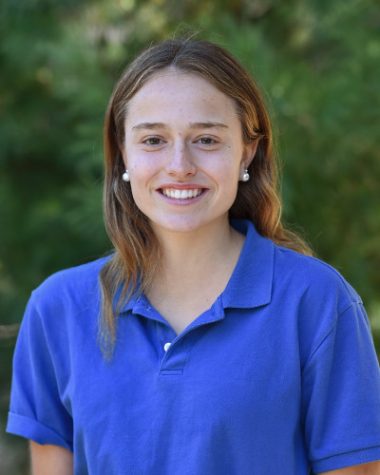From the Tokyo Olympics to Sleepaway Camp, Summer of 2021 puts a Spotlight on Mental Health
October 4, 2021
Everywhere I turned this summer, mental instability was in view. The heightened feeling of anxiety and depression can be traced back to our year of isolation, vulnerability, and fear with the pandemic. The Covid-19 epidemic has infected our lives on every level. Not until I went to summer camp and saw the problem up close did I truly understand the devastation of COVID on our generation. Similarly, not until Simone Biles stepped back from the Olympics did the entire world finally grasp the vast impact of the pandemic.
In January of 2021, Macy Millones ‘23 decided to start the Mind Matters Club at SLS. She recently shared her thoughts on why the pandemic has increased mental health challenges for teenagers.
“When a government lockdown was issued, various mental health struggles were revealed, and for some – intensified. Isolation left teenagers feeling alone and depressed, many grappling with the loss of an important social network that in-person learning created. In the wake of the lockdown we were tasked with reacclimating ourselves to simple interactions with friends. For me, this brought a new wave of anxiety that I’m sure many teenagers can relate to.”
During all of the uncertainty and alarm of the pandemic, there was nothing I was looking forward to more than sleepaway camp this past summer. For the past six years, camp has been a carefree, happy place marked by late-night storytelling sessions, trips to the beach, movies every Thursday, international friends, and creative activities. But this summer was not what I imagined.
I knew something was off the moment I arrived at camp. Most notable was the sadness of the counselors. The head of camp did not share significant information about Covid restrictions with any staff members until they got to camp. The day my counselor arrived, she learned that leaving campgrounds was not permitted, the camp was understaffed, and to make matters worse, she said she was grossly underpaid. Her behavior reflected the stress of the summer. She stayed in bed all day, missed activities, and didn’t hang out with anyone during her off nights. It was difficult for us to be there for her because we didn’t know how to help. After roughly 15 years at camp, she said that this would be her last year.
In addition to counselors, the campers themselves were struggling. Before this summer, I hadn’t yet acknowledged the full extent to which the coronavirus affected our generation, yet the devastating impact of COVID-19 on teenagers permeated every aspect of camp life. I saw my closest friends, who were online the entire year, struggle with depression, anxiety, and eating disorders.
My best friend was on zoom for the whole year and was diagnosed with depression and anxiety before arriving at camp. She was so excited to come because it was supposed to provide a mental escape from her school life. However, when you’re living in an environment with so many mentors and counselors sad and unhappy, the mood starts to weigh down on everyone. During one of the coldest nights at camp (it was 50 degrees in the cabin), we were all physically uncomfortable, which made my friend anxious. After that night, she couldn’t sleep in her own bed. Instead, she would come up into my bunk around midnight and try to fall asleep there. I could hear her moving around and wrestling with the cover. After about thirty minutes, I would walk with her to the health center. She started to wear the same clothes every day and got less and less talkative as camp progressed.
While I was helping my friends at camp, Simone Biles’ anxiety with the Olympics was highlighted across international headlines, stressing the point that even elite athletes trained to deal with high-pressure situations can feel anxious.
Since the 2016 Rio Olympics, Simone Biles became an inspiration and hero for aspiring athletes. Her remarkable talent and strength put her in a category of its own. In many eyes, she is a hero. However, her courage extends beyond the “vaults” and “high beams” of gymnastics. In the wake of the coronavirus, Simone Biles acknowledged her vulnerability and exposed her own battle with anxiety, showing that no one is immune to these feelings.
At the 2021 Tokyo Olympics, Simone lost her sense of positioning in the air during a twisting maneuver and then revealed to her 6.6 million Instagram followers that she has the dreaded “twisties” (a mental block when an athlete loses their spatial awareness).
Despite all the pressure from corporate sponsors, fans, and the news media, Simone had the strength to step back and withdraw. During a time when so many people have struggled with anxiety amidst a global pandemic, Simone’s decision to prioritize mental health not only inspires athletes to speak up but confirms that mental health issues affect everyone and it’s time they are taken seriously.
Simone Biles spotlights the harsh pressure that elite athletes face in high-stakes moments, whereas my camp friend symbolizes the many regular teenagers who silently struggle with the day-to-day drain of school compounded with the existential fear of the pandemic. When we examine mental health in our generation, we shouldn’t think anyone is unique or alone in the struggle. It turns out, Simone Biles and my friend are more similar than we thought.
I don’t know what next summer will hold for me, but whether or not I go to camp, the lessons I learned from this past year will always stick with me. In the meantime, I’m grateful to my friends who started the SLS Mind Matters Club, which is working to destigmatize mental illness.
Ms. Olsen, the Director of Counseling Services, explains how the SLS counseling team is here to support students.
“When things are going well and you want to share an idea about a goal or hope for the future, we are here to listen. We are always available to talk, no matter what you may need or be going through. We know that it isn’t always easy to ask for help. We want students to know that we are a safe space, a judgement-free zone, here to help however we can.”
If you are struggling right now, don’t hesitate to reach out to our school’s Counseling Team [email protected], [email protected], or [email protected].





Elaine Camerota • Oct 5, 2021 at 6:07 am
You have written a wonderful, comprehensive, thorough article written with empathy and compassion. Congratulations!